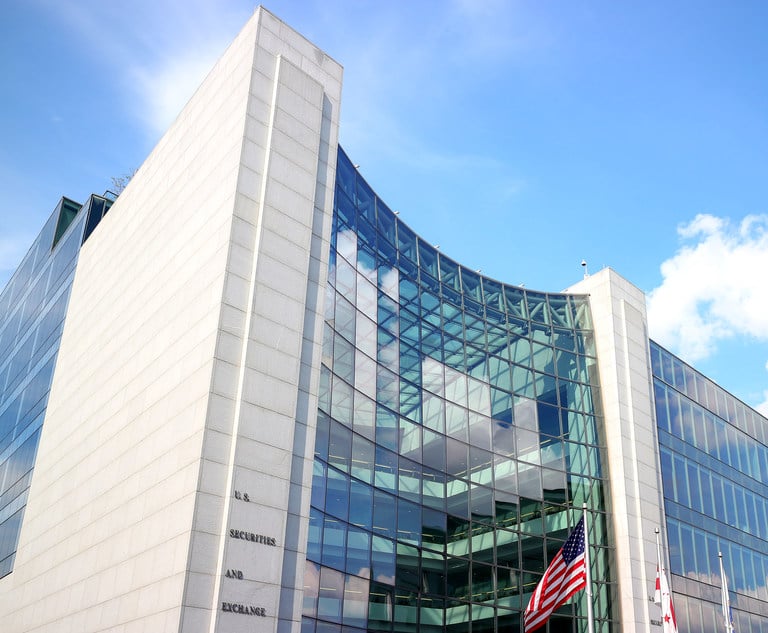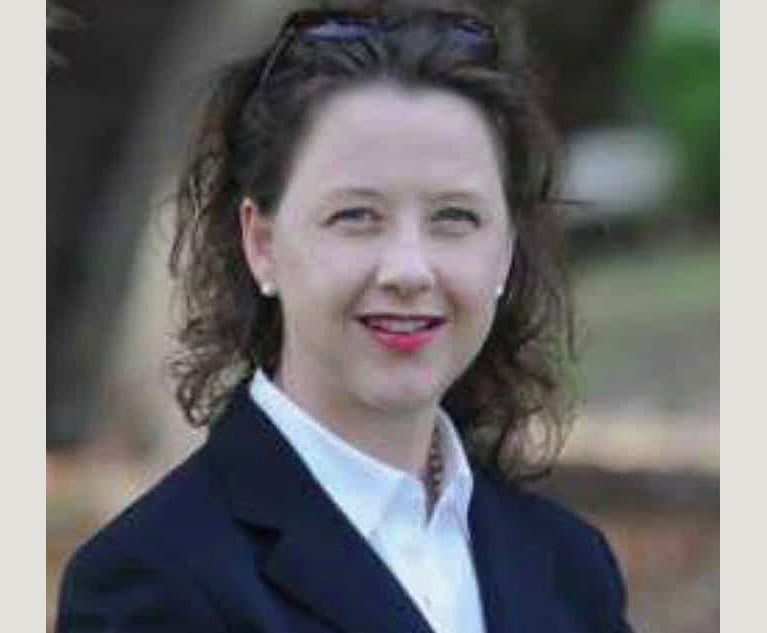Surveillance Tactics Under Heightened Scrutiny, 'Destructive' to Muslim Communities
Government programs and tactics designed to track Muslims in communities around the United States may face heightened scrutiny in the wake of a recent U.S. Supreme Court decision limiting the use of cellphone data in criminal investigations, and a high-profile settlement reached in a lawsuit targeting a New York City Police Department program.
July 20, 2018 at 05:33 PM
4 minute read
 Government programs and tactics designed to track Muslims in communities around the United States may face heightened scrutiny in the wake of a recent U.S. Supreme Court decision limiting the use of cellphone data in criminal investigations, and a high-profile settlement reached in a lawsuit targeting a New York City Police Department program . Advocates at a conference hosted at Georgetown Law's Center on Privacy and Technology, The Color of Surveillance , said this week that efforts to monitor Muslim communities create a destructive and discriminatory environment reminiscent of past government efforts targeting Jewish and black Americans. In New York City, the police department reached settlements that include reforms and stricter guidance in investigating religious or ethnic groups. New York University graduate student Asad Dandia and U.S. Army Sgt. Farhaj Hassan, lead plaintiffs in separate lawsuits filed against the NYPD, said the impact of surveillance on Muslims continues to run deep in their communities. In these cases, police used video surveillance, informants and community mapping. Under the settlement, the department is barred from launching investigations if race, religion, ethnicity or national origin, among other limitations, is a substantial or motivating favor. A recent 5-4 U.S. Supreme Court decision, Carpenter v. United States, creates a higher privacy standard in investigations by limiting the use of cellphone records. It could have sweeping implications for other types of digital information. The opinion, however, added it “does not consider other collection techniques involving foreign affairs or national security.” In Dandia's case, the NYPD used an informant and other techniques to track him and his friends' nonprofit, which donated food to the hungry through their local mosque in Brooklyn. Even with the settlement and changes, distrust grew in the community and it became more difficult to raise money at the mosque, he said. “A lot of people cut off communication with one another,” Dandia said. “We reached a settlement in the lawsuit and we were pleased with the support of the local community. It's just one step closer to a broader process of seeking justice.” Other government programs have been launched that led to divisions within communities, according to a panel moderated by Alvaro Bedoya, executive director of the Center on Privacy & Technology at Georgetown Law. The discussion became heated at times, with some people criticizing the programs as divisive and discriminatory. Ayaan Dahir with the Young Muslim Collective spoke out about a Countering Violent Extremism program launched in Minneapolis, one of several around the country that mark Muslim people in the community and track them in schools and their communities. “You see a community, a population of people who are already very vulnerable, the impact that this type of monitoring would have on places that should be safe,” Dahir said. “In this program, the constant equivocation of Muslims as terrorists, or inherently and uniquely susceptible to radicalization, has really put a target on our backs from the larger community.” Supporters argue the programs can serve to create better communication between government and communities. William Braniff with the University of Maryland's National Consortium for the Study of Terrorism and Responses to Terrorism, speaking in favor of the programs, said these efforts, which are also in cities including Boston and Los Angeles, have room to improve and do not necessarily only use surveillance, but collect data to prevent terrorism. “The reason I'm a staunch supporter is because I believe is it the ability to minimize polarization if done correctly,” Braniff said.
Government programs and tactics designed to track Muslims in communities around the United States may face heightened scrutiny in the wake of a recent U.S. Supreme Court decision limiting the use of cellphone data in criminal investigations, and a high-profile settlement reached in a lawsuit targeting a New York City Police Department program . Advocates at a conference hosted at Georgetown Law's Center on Privacy and Technology, The Color of Surveillance , said this week that efforts to monitor Muslim communities create a destructive and discriminatory environment reminiscent of past government efforts targeting Jewish and black Americans. In New York City, the police department reached settlements that include reforms and stricter guidance in investigating religious or ethnic groups. New York University graduate student Asad Dandia and U.S. Army Sgt. Farhaj Hassan, lead plaintiffs in separate lawsuits filed against the NYPD, said the impact of surveillance on Muslims continues to run deep in their communities. In these cases, police used video surveillance, informants and community mapping. Under the settlement, the department is barred from launching investigations if race, religion, ethnicity or national origin, among other limitations, is a substantial or motivating favor. A recent 5-4 U.S. Supreme Court decision, Carpenter v. United States, creates a higher privacy standard in investigations by limiting the use of cellphone records. It could have sweeping implications for other types of digital information. The opinion, however, added it “does not consider other collection techniques involving foreign affairs or national security.” In Dandia's case, the NYPD used an informant and other techniques to track him and his friends' nonprofit, which donated food to the hungry through their local mosque in Brooklyn. Even with the settlement and changes, distrust grew in the community and it became more difficult to raise money at the mosque, he said. “A lot of people cut off communication with one another,” Dandia said. “We reached a settlement in the lawsuit and we were pleased with the support of the local community. It's just one step closer to a broader process of seeking justice.” Other government programs have been launched that led to divisions within communities, according to a panel moderated by Alvaro Bedoya, executive director of the Center on Privacy & Technology at Georgetown Law. The discussion became heated at times, with some people criticizing the programs as divisive and discriminatory. Ayaan Dahir with the Young Muslim Collective spoke out about a Countering Violent Extremism program launched in Minneapolis, one of several around the country that mark Muslim people in the community and track them in schools and their communities. “You see a community, a population of people who are already very vulnerable, the impact that this type of monitoring would have on places that should be safe,” Dahir said. “In this program, the constant equivocation of Muslims as terrorists, or inherently and uniquely susceptible to radicalization, has really put a target on our backs from the larger community.” Supporters argue the programs can serve to create better communication between government and communities. William Braniff with the University of Maryland's National Consortium for the Study of Terrorism and Responses to Terrorism, speaking in favor of the programs, said these efforts, which are also in cities including Boston and Los Angeles, have room to improve and do not necessarily only use surveillance, but collect data to prevent terrorism. “The reason I'm a staunch supporter is because I believe is it the ability to minimize polarization if done correctly,” Braniff said.This content has been archived. It is available through our partners, LexisNexis® and Bloomberg Law.
To view this content, please continue to their sites.
Not a Lexis Subscriber?
Subscribe Now
Not a Bloomberg Law Subscriber?
Subscribe Now
NOT FOR REPRINT
© 2025 ALM Global, LLC, All Rights Reserved. Request academic re-use from www.copyright.com. All other uses, submit a request to [email protected]. For more information visit Asset & Logo Licensing.
You Might Like
View All
Hogan Lovells, Jenner & Block Challenge Trump EOs Impacting Gender-Affirming Care
3 minute read
GOP-Led SEC Tightens Control Over Enforcement Investigations, Lawyers Say

SEC Sued for Failing to Reveal Records Involving Simpson Thacher Attorney
4 minute read
Ex-Prosecutor’s Trial Ends as Judge Throws Out Her Felony Indictment in Ahmaud Arbery Death Case
Trending Stories
- 1Justified Termination Does Not Bar Associate Attorney From Unemployment Benefits, State Appellate Court Rules
- 2Effective Termination Strategies in Today’s Troubled Condo Market
- 3AI and Land Use—a Perfect Match in Real Estate Heaven
- 4New Atlanta Litigation Firm Breaks Away From Swift Currie
- 5Florida Law Schools Are Seeing a Bump in Applications for 2025, After Recent Declines at Flagship Schools
Who Got The Work
J. Brugh Lower of Gibbons has entered an appearance for industrial equipment supplier Devco Corporation in a pending trademark infringement lawsuit. The suit, accusing the defendant of selling knock-off Graco products, was filed Dec. 18 in New Jersey District Court by Rivkin Radler on behalf of Graco Inc. and Graco Minnesota. The case, assigned to U.S. District Judge Zahid N. Quraishi, is 3:24-cv-11294, Graco Inc. et al v. Devco Corporation.
Who Got The Work
Rebecca Maller-Stein and Kent A. Yalowitz of Arnold & Porter Kaye Scholer have entered their appearances for Hanaco Venture Capital and its executives, Lior Prosor and David Frankel, in a pending securities lawsuit. The action, filed on Dec. 24 in New York Southern District Court by Zell, Aron & Co. on behalf of Goldeneye Advisors, accuses the defendants of negligently and fraudulently managing the plaintiff's $1 million investment. The case, assigned to U.S. District Judge Vernon S. Broderick, is 1:24-cv-09918, Goldeneye Advisors, LLC v. Hanaco Venture Capital, Ltd. et al.
Who Got The Work
Attorneys from A&O Shearman has stepped in as defense counsel for Toronto-Dominion Bank and other defendants in a pending securities class action. The suit, filed Dec. 11 in New York Southern District Court by Bleichmar Fonti & Auld, accuses the defendants of concealing the bank's 'pervasive' deficiencies in regards to its compliance with the Bank Secrecy Act and the quality of its anti-money laundering controls. The case, assigned to U.S. District Judge Arun Subramanian, is 1:24-cv-09445, Gonzalez v. The Toronto-Dominion Bank et al.
Who Got The Work
Crown Castle International, a Pennsylvania company providing shared communications infrastructure, has turned to Luke D. Wolf of Gordon Rees Scully Mansukhani to fend off a pending breach-of-contract lawsuit. The court action, filed Nov. 25 in Michigan Eastern District Court by Hooper Hathaway PC on behalf of The Town Residences LLC, accuses Crown Castle of failing to transfer approximately $30,000 in utility payments from T-Mobile in breach of a roof-top lease and assignment agreement. The case, assigned to U.S. District Judge Susan K. Declercq, is 2:24-cv-13131, The Town Residences LLC v. T-Mobile US, Inc. et al.
Who Got The Work
Wilfred P. Coronato and Daniel M. Schwartz of McCarter & English have stepped in as defense counsel to Electrolux Home Products Inc. in a pending product liability lawsuit. The court action, filed Nov. 26 in New York Eastern District Court by Poulos Lopiccolo PC and Nagel Rice LLP on behalf of David Stern, alleges that the defendant's refrigerators’ drawers and shelving repeatedly break and fall apart within months after purchase. The case, assigned to U.S. District Judge Joan M. Azrack, is 2:24-cv-08204, Stern v. Electrolux Home Products, Inc.
Featured Firms
Law Offices of Gary Martin Hays & Associates, P.C.
(470) 294-1674
Law Offices of Mark E. Salomone
(857) 444-6468
Smith & Hassler
(713) 739-1250








